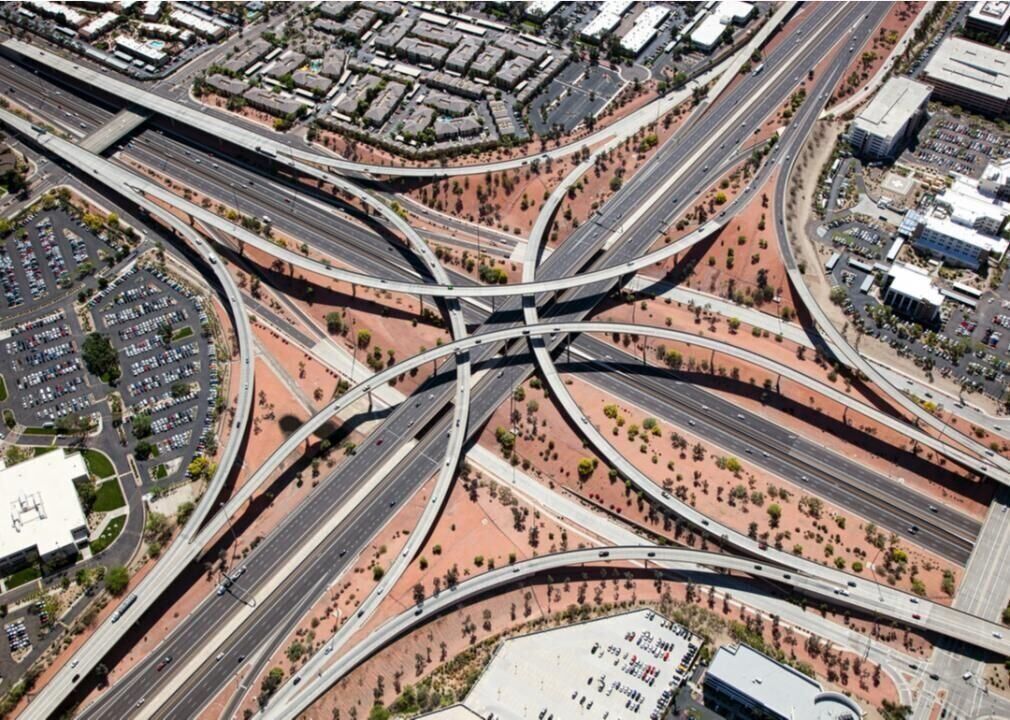PHOENIX — Republicans who hold the Arizona Legislature majority are working to strike a final deal with Gov. Katie Hobbs and leaders of cities, counties and tribes in metro Phoenix over extending a transportation tax, and the outcome has statewide implications.
Failure to get a plan out of the Legislature that the Democratic governor will sign — and that can win support of Maricopa County voters next year — would affect all of Arizona.
That’s because the regional planning agency called Maricopa Association of Governments, or MAG, funds its own projects outside the state government general fund using the sales tax proceeds. If Maricopa County voters don’t extend the tax for another 20 years, it will go away, after paying for massive expansions of the region’s freeway and roads system, bus routes and light rail over nearly four decades.
If the tax is extended, proceeds will average about $1 billion a year over the coming 20 years. If it goes away, transportation projects in the other 14 counties will suddenly be competing for limited state transportation dollars with a county that is home to nearly two-thirds of Arizonans.
The lack of an agreement on which plan to send to voters remains the sole major issue remaining for the Legislature to address in this year’s session. The highly unusual session has seen multiple prolonged breaks, including one that will have stretched nearly seven weeks when lawmakers return Monday, July 31. Hobbs vetoed the Legislature’s plan for the transportation tax extension in June, siding with MAG, whose plan was eviscerated by GOP lawmakers.
Republican House Speaker Ben Toma told Capitol Media Services lawmakers plan to adjourn for the year the day they return Monday, with a potential deal on asking voters to extend the tax, known as Proposition 400, and some “administrative types of things’’ all that remain to be accomplished.
Tentative deal?
Toma and GOP Senate President Warren Petersen both said there’s been progress on settling the Proposition 400 extension but stopped short of proclaiming a breakthrough.
But Sen. Ken Bennett, R-Prescott, said he’s been told a tentative deal is in place, though bill language still needs to be finalized.
That squares with Toma’s statement that MAG has to come back with an acceptable response for a deal to happen.
“Unfortunately, I can’t tell you if we’re going to have the deal or not yet, at this point,’’ Toma said in an interview late last week. “We’ve been waiting for a response back from MAG, and my understanding is they’re waiting for input from some of their people before they respond to us.’’
Getting Toma on board is critical, since new House rules adopted in January by majority Republicans say the speaker must sign off on all legislation before it goes up for a vote.
“The starting point is really they have to bring us back language or something that we can get the votes for — and I guess to be blunt, starting with mine,’’ Toma said. “So if they can’t get my vote, I’m not sure how they’re going to get any others at this point.’’
Hobbs’ spokesman Christian Slater declined to comment on the status of negotiations. A spokeswoman for MAG also wouldn’t comment, and new MAG chair Kate Gallego, mayor of Phoenix, didn’t immediately answer requests for comment.
Gallego, who took over as MAG chair from Avondale Mayor Kenn Weise last month, said in a news release after being elected as the group’s leader that extending Proposition 400 is top priority for the group of 27 mayors, three tribes and two counties.
Hobbs took over the lead in negotiations for the sales tax extension in late May, shortly after she signed a state budget for the fiscal year that began July 1 which she negotiated with Republican lawmakers.
Rather than adjourn for the year, GOP leaders kept lawmakers in session after the budget was enacted, mainly to keep up pressure on the governor, the first Democrat to hold the office in nearly 15 years.
Dispute: Roads vs. mass transit
The tax-extension proposal Republican lawmakers sent to Hobbs, which she vetoed, dedicated much more of the estimated $20 billion the sales tax would collect over 20 years to freeway and major road building and maintenance than MAG’s plan. It also slashed the portion of the revenue that would go to public transit and barred any from being spent to extend the Phoenix metro area’s light rail system. And, it split the extension vote into two parts, one for the road and highway projects and one for light rail maintenance.
Also tucked into the GOP-passed plan was a provision requiring the Arizona Department of Transportation to set the speed limit on all Maricopa County freeways at 65 mph or higher. That’s designed to eliminate a 55 mph limit on the portion of Interstate 17 between the Capitol and Dunlap Avenue.
Getting a deal on Proposition 400 done in the one day the Legislature plans to be in session next week would be unusual, but Toma said it can be done.
“And secondly, there’s nothing precluding the governor from calling a special session if she so chose, and if we have a deal,’’ Toma said.
Rep. David Cook, R-Globe, who chairs the House Transportation Committee, said Tuesday that the agreement is “95% done.’’
“I can’t in my position get the 5% done with the governor and the Senate and the House,’’ Cook said. “It’s going to take those (other) elected leaders to do that.’’
Get your morning recap of today's local news and read the full stories here: http://tucne.ws/morning





